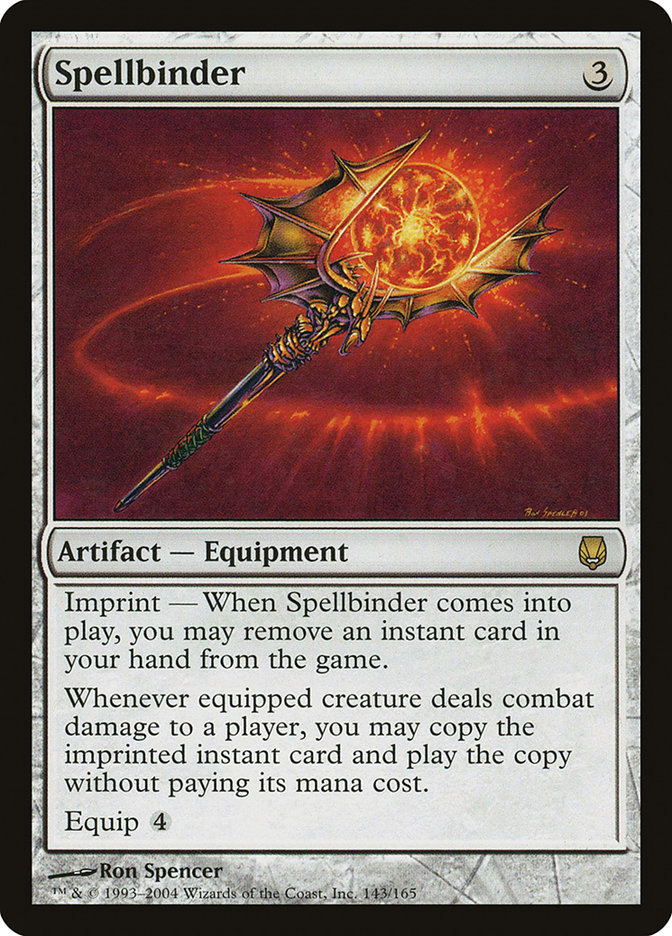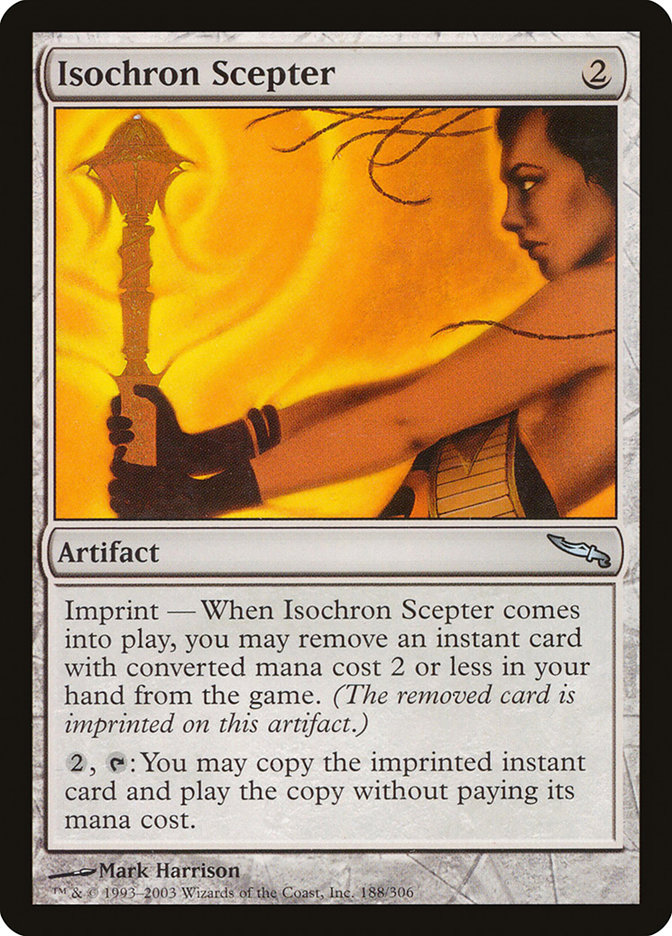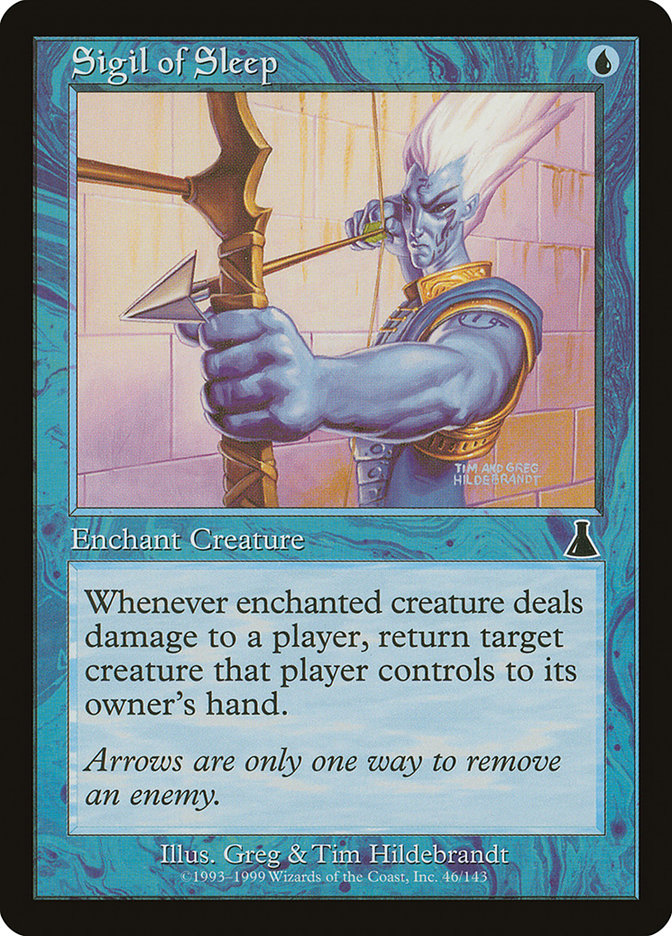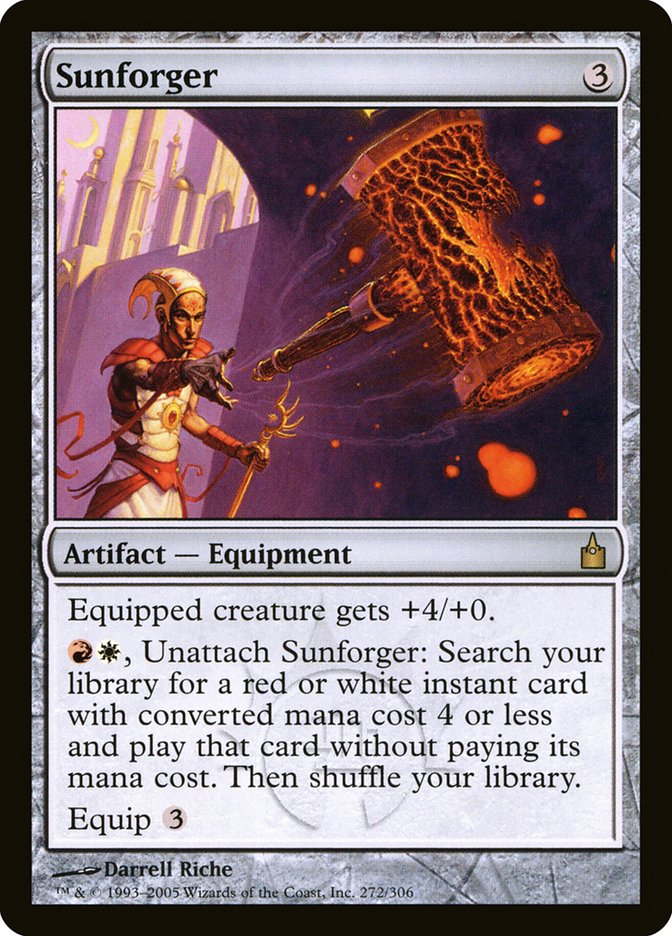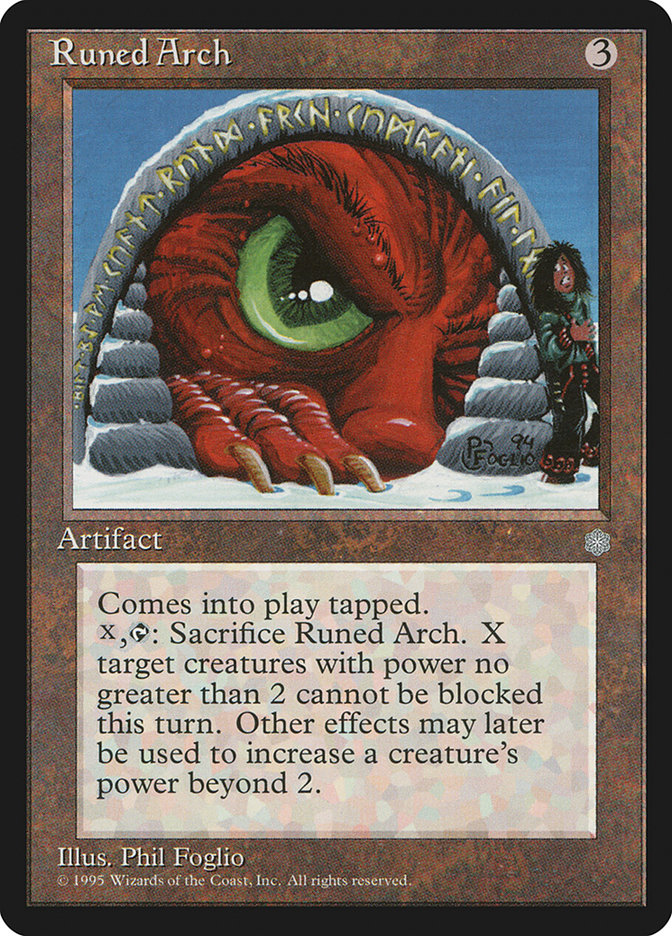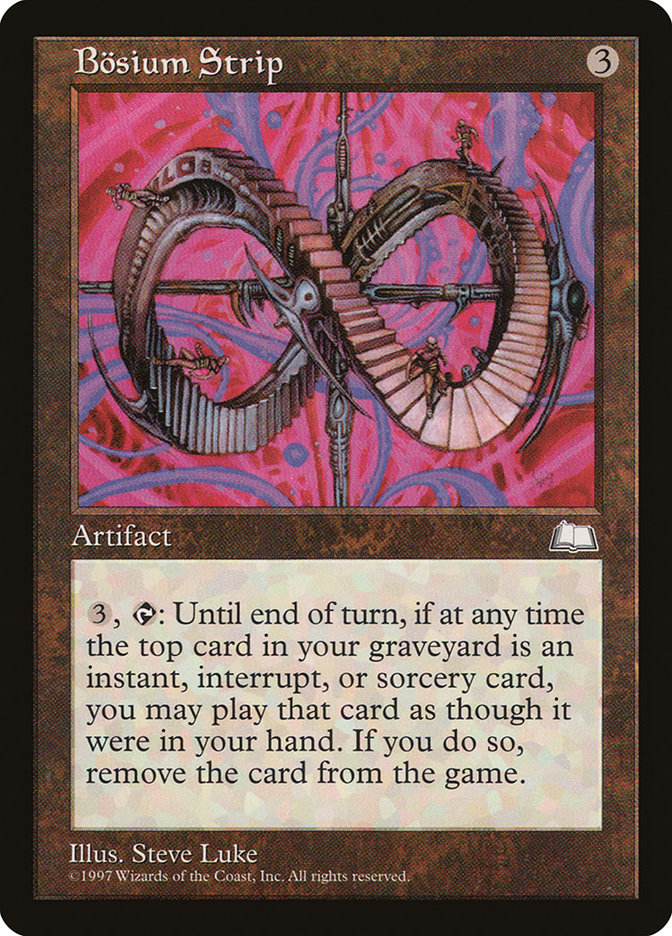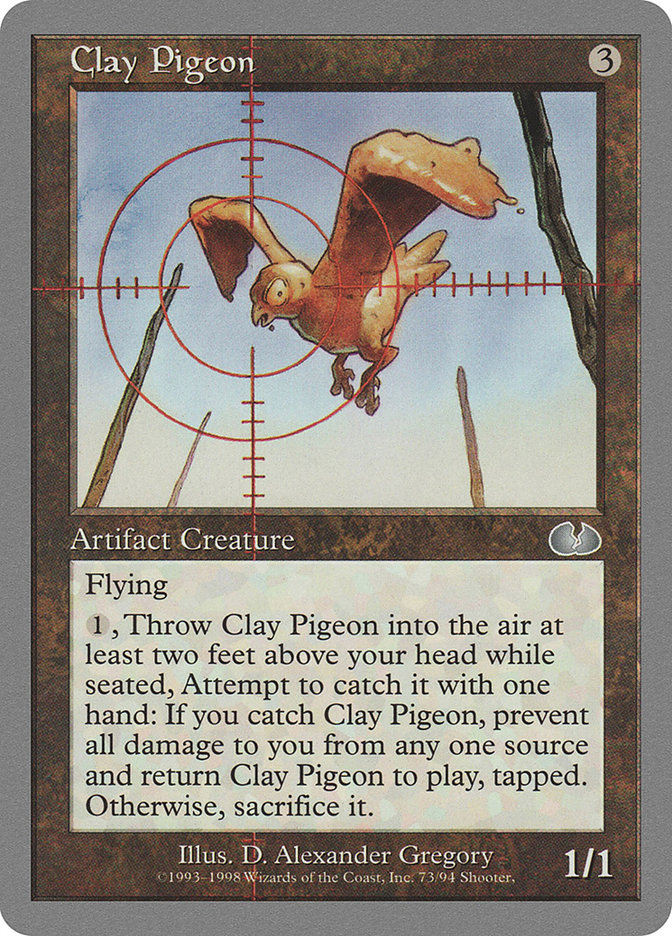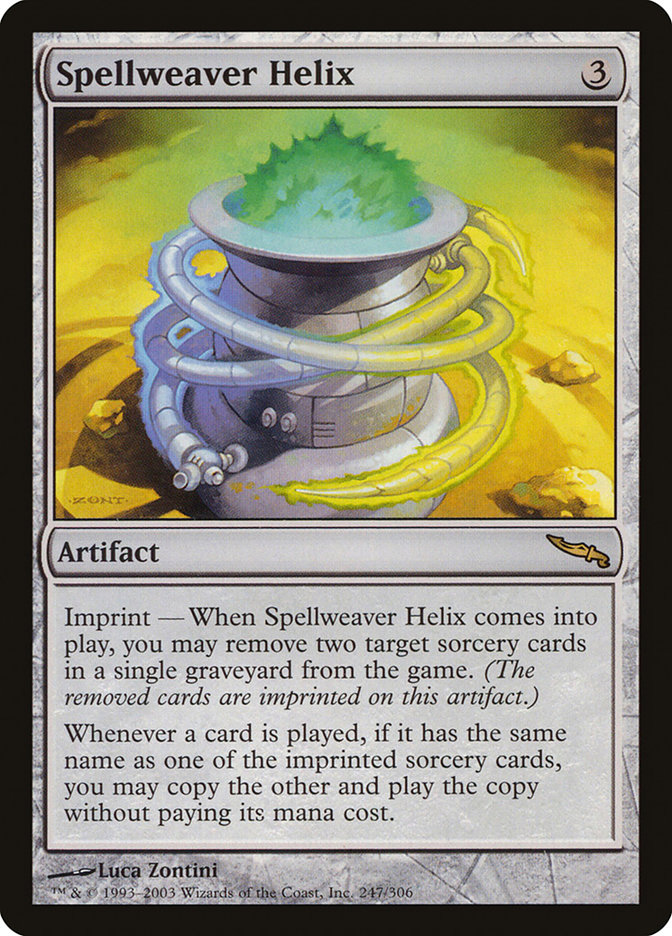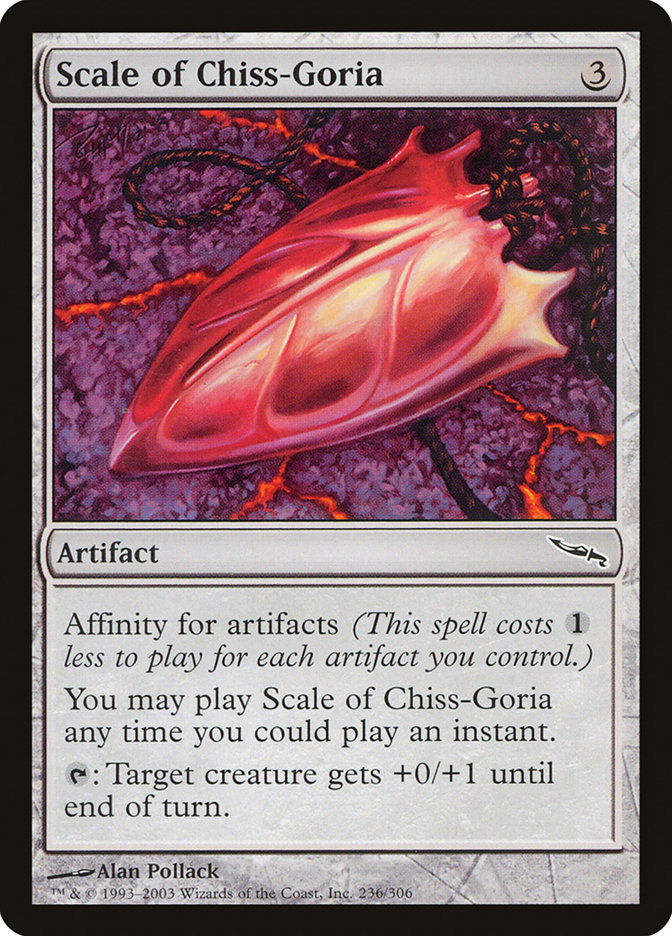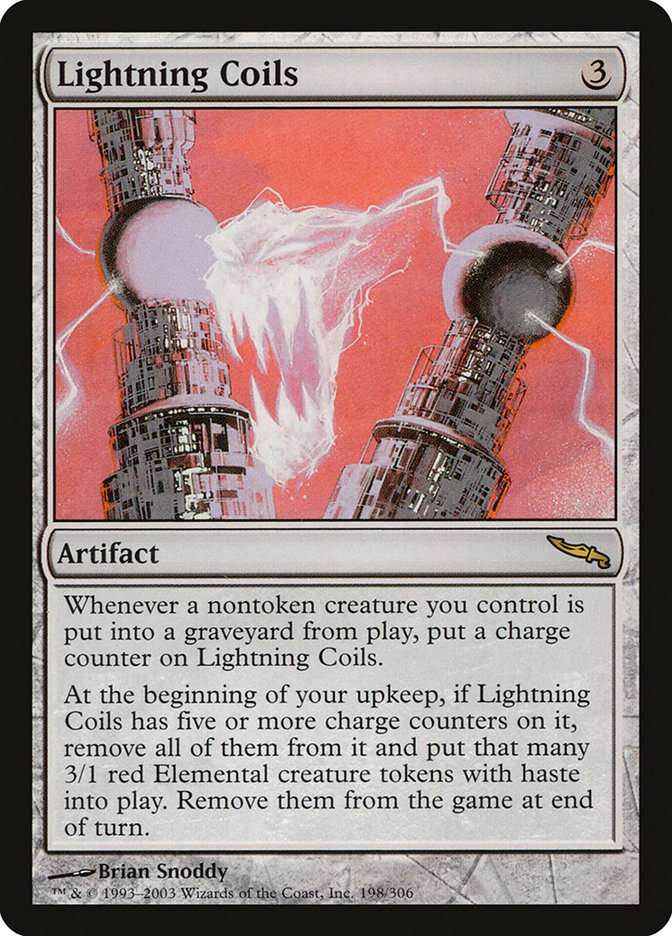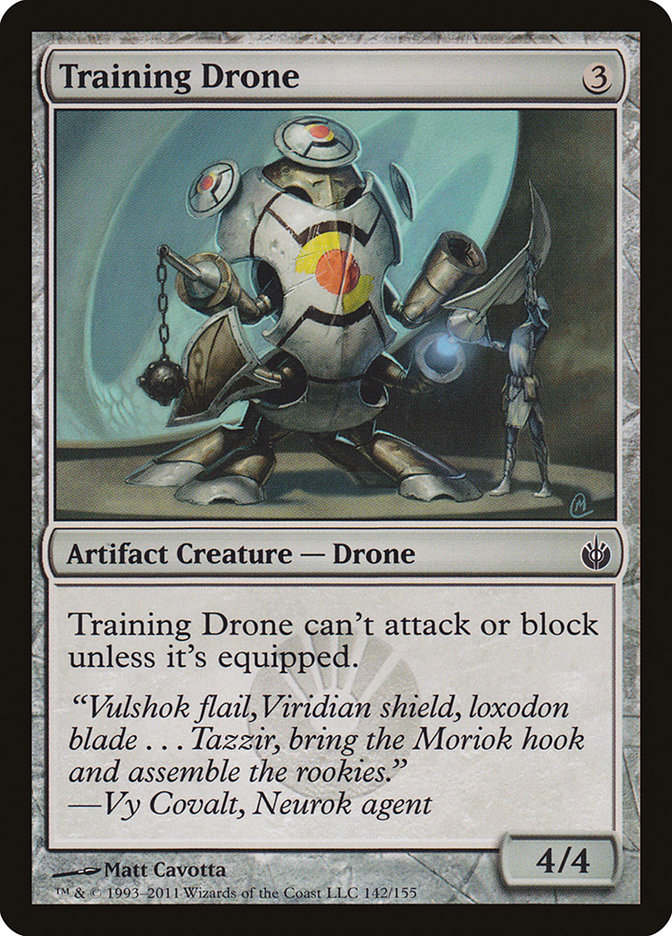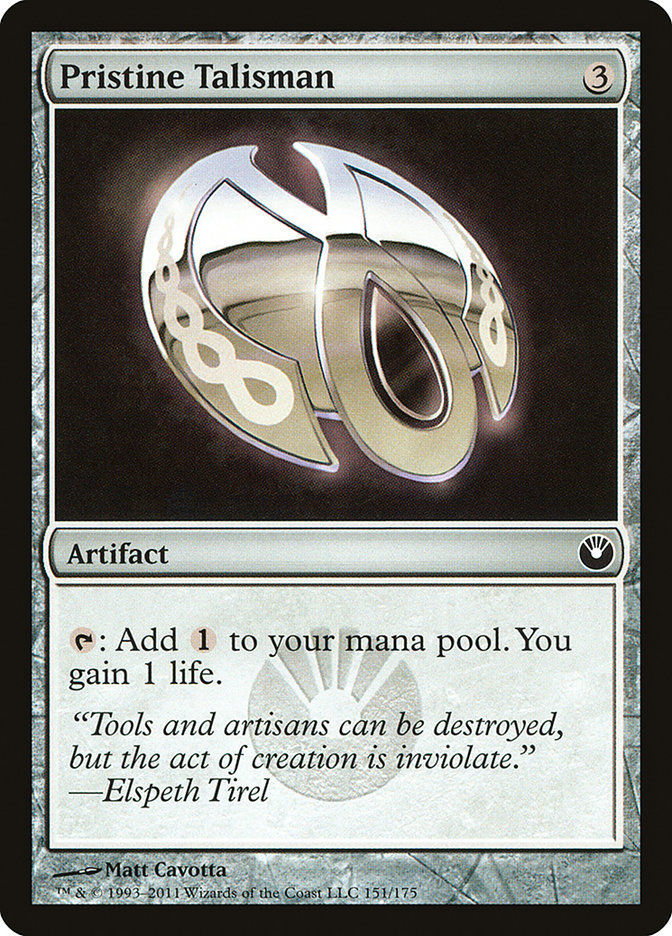Spellbinder MTG Card
| Mana cost | |
| Converted mana cost | 3 |
| Rarity | Rare |
| Type | Artifact — Equipment |
| Abilities | Equip,Imprint |
| Released | 2004-02-06 |
| Set symbol | |
| Set name | Darksteel |
| Set code | DST |
| Number | 143 |
| Frame | 2003 |
| Layout | Normal |
| Border | Black |
| Illustred by | Ron Spencer |
Text of card
Imprint When Spellbinder comes into play, you may remove an instant card in your hand from the game. Whenever equipped creature deals combat damage to a player, you may copy the imprinted instant card and play the copy without paying its mana cost. Equip
Cards like Spellbinder
Spellbinder is a unique artifact in the Magic: The Gathering landscape, bringing a twist to instantaneous combat tricks. When we compare it to Isochron Scepter, a notable similarity emerges in the ability to repeatedly cast a particular spell. Nevertheless, Spellbinder demands a direct combat trigger to cast the imprinted instant, whereas Isochron Scepter provides more control, allowing activation at will for a consistent two mana investment.
Delving into comparisons with other equipment, Sigil of Sleep offers an intriguing parallel. While also reliant on combat to activate, the Sigil doesn’t allow for repeated spell casting but instead delivers a steady return by bouncing creatures to an opponent’s hand. Although it can’t replicate specific spells like Spellbinder, its effect is more predictable and less mana-intensive.
Assessing against the likes of Sunforger, another equipment that excels in reusing instances, we note that Sunforger grants the freedom to choose different suitable spells each activation. This flexibility contrasts with Spellbinder’s commitment to one imprinted spell, though both cards share the bond with combat interactions. In essence, while each serves a strategic purpose, Spellbinder asks for tactical planning to maximize combat impact within MTG decks that value surprise and interaction timing.
Cards similar to Spellbinder by color, type and mana cost
Card Pros
Card Advantage: The allure of the Spellbinder lies in its ability to turn any attack into a potential stream of additional spells. By imprinting a powerful instant or sorcery, you can repeatedly cast it whenever the equipped creature deals combat damage to a player.
Resource Acceleration: With every successful attack, Spellbinder can potentially cast expensive spells earlier than your mana base would normally allow. This acceleration can be a game-changer, permitting formidable plays that can swing the tide in your favor rapidly.
Instant Speed: Spellbinder’s magic doesn’t end at sorceries; it shines by enabling you to cast imprinted instants during combat. This flexibility means you can adapt on the fly to battlefield shifts, unleashing your spells at the most impactful moments to disrupt your opponents’ strategies.
Card Cons
Discard Requirement: Navigating a game of MTG often revolves around maintaining a strong hand. Spellbinder, unfortunately, presents a scenario where discarding a card becomes a necessity. This cost, especially in intricate moments of gameplay, could set you back as you forfeit potential plays.
Specific Mana Cost: The versatility of a card is sometimes its greatest asset. Spellbinder falls short in this regard as its specific mana cost demands a dedicated deck built around its color identity, which may deter a segment of players from integrating it into their arsenal.
Comparatively High Mana Cost: Optimal mana efficiency is key to victory. When compared to other options available in the MTG universe, Spellbinder’s mana cost leans towards the higher end. This inclination might push players to consider alternatives that promise a similar payoff without the hefty mana investment.
Reasons to Include Spellbinder in Your Collection
Versatility: Spellbinder is a unique card that can be attached to any instant in your deck, significantly altering your strategy and catching opponents off guard. Its flexibility makes it a valuable addition to decks that thrive on surprise and versatility.
Combo Potential: With its ability to imprint an instant and cast it upon dealing combat damage, Spellbinder opens the door for numerous combo possibilities. Whether it’s a powerful damage spell or a game-changing utility instant, the potential to turn the tide of the game is immense.
Meta-Relevance: In a meta where instant speed interactions are key, Spellbinder can continuously leverage the most impactful spells from your deck. It shines in environments where reacting during your opponent’s turn or having repeatable effects can dictate the pace and outcome of the game.
How to beat
Spellbinder is a unique MTG card that can create daunting scenarios for your opponents when it successfully imprints an instant or sorcery. Understanding the card’s mechanics is key – it allows an imprinted spell to be cast whenever the equipped creature deals combat damage to a player. To effectively counter this strategy, consider utilizing creature removals or spells that prevent combat damage. Eliminating the equipped creature disrupts the synergy, rendering Spellbinder useless.
Moreover, incorporating counter spells in your deck can be an effective line of defense. By countering the activated ability of Spellbinder when it triggers, you prevent any potentially game-altering instant or sorcery from disrupting your strategy. Additionally, enchantment removals can target Spellbinder directly, bypassing the need to deal with the creature it’s attached to. Prioritize these removals and counters in your sideboard against decks relying on equipment like Spellbinder to reinforce your gameplay and maintain control over the duel.
Ultimately, handling Spellbinder requires a mix of preemptive planning and immediate responses. Including versatile instant-speed interaction in your deck strategies can offer a safety net against the surprise onslaught that Spellbinder aims to deliver.
Where to buy
If you're looking to purchase Spellbinder MTG card by a specific set like Darksteel, there are several reliable options to consider. One of the primary sources is your local game store, where you can often find booster packs, individual cards, and preconstructed decks from current and some past sets. They often offer the added benefit of a community where you can trade with other players.
For a broader inventory, particularly of older sets, online marketplaces like TCGPlayer, Card Kingdom and Card Market offer extensive selections and allow you to search for cards from specific sets. Larger e-commerce platforms like eBay and Amazon also have listings from various sellers, which can be a good place to look for sealed product and rare finds.
Additionally, Magic’s official site often has a store locator and retailer lists for finding Wizards of the Coast licensed products. Remember to check for authenticity and the condition of the cards when purchasing, especially from individual sellers on larger marketplaces.
Below is a list of some store websites where you can buy the Spellbinder and other MTG cards:
 BUY NOW
BUY NOW BurnMana is an official partner of TCGPlayer
- eBay
- Card Kingdom
- Card Market
- Star City Games
- CoolStuffInc
- MTG Mint Card
- Hareruya
- Troll and Toad
- ABU Games
- Card Hoarder Magic Online
- MTGO Traders Magic Online
See MTG Products
Legalities
Magic the Gathering formats where Spellbinder has restrictions
| Format | Legality |
|---|---|
| Commander | Legal |
| Legacy | Legal |
| Modern | Legal |
| Oathbreaker | Legal |
| Vintage | Legal |
| Duel | Legal |
| Predh | Legal |
| Penny | Legal |
Rules and information
The reference guide for Magic: The Gathering Spellbinder card rulings provides official rulings, any errata issued, as well as a record of all the functional modifications that have occurred.
| Date | Text |
|---|---|
| 2004-12-01 | If the copied card is a split card, you choose which one side of it to cast, but you can’t cast both sides. You can choose the other side later in the game, though. |
| 2004-12-01 | Spellbinder imprints a card only once, when it enters the battlefield. Attaching Spellbinder to a creature doesn’t trigger its enters-the-battlefield ability. |
| 2004-12-01 | Spellbinder’s second ability allows you to create a copy of the imprinted instant card in the Exile zone (that’s where the imprinted instant card is) and then cast it without paying its mana cost. |
| 2004-12-01 | You don’t pay the spell’s mana cost. If the spell has X in its mana cost, X is 0. You do pay any additional costs for that spell. You can’t use any alternative costs. |
| 2005-03-01 | The creation of the copy and then the casting of the copy are both optional. |
